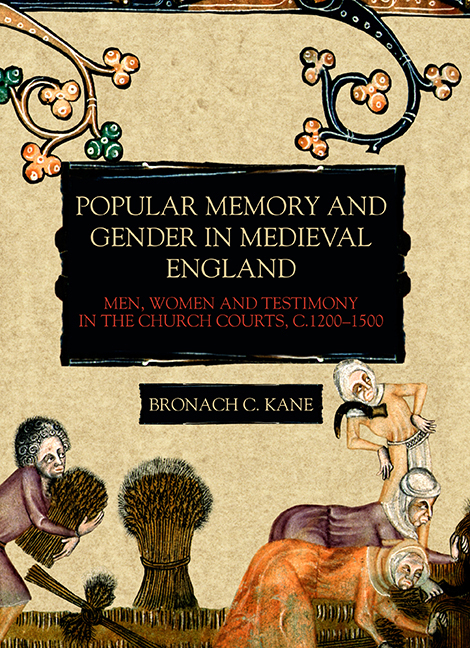 Popular Memory and Gender in Medieval England
Popular Memory and Gender in Medieval England The aim of this book has been to explore everyday perceptions and manifestations of the past in England from the early thirteenth to the late fifteenth centuries. Memory was ubiquitous in many strands of life during this period, underpinning the shape of religious, economic, and social institutions, and accruing new kinds of gendered meaning for men and women with each stage of the life cycle. Most significant, though, was its prevalence in everyday situations where the past was used to make sense of the present and to plan for the future. Custom, rights over land and property, memories of life events, and commemoration depended on types of remembrance – social, environmental, personal, or generational – that overlapped, but were organised and deployed in distinctive ways. Gender was a central influence upon attitudes towards the past, both reinforcing patriarchal values through normative models of behaviour, and offering a field in which these could be contested and redefined.
Versions of the past conveyed strands of men and women's gendered experiences in subjectivities that revealed the anticipation of the law in everyday life. The intrinsic function of the law influenced people's social, economic, and religious behaviour from the outset, while awareness of its nuances and malleability saw the emergence and use of recognisable motifs and tropes in narratives that shifted subtly over time. Representations of the past in witness testimony did not signify the existence of unmediated discourses, but instead contained interpretations of the law based on the perceptions of litigants, witnesses, and their counsel. Social experience was formed in part through contact with and apprehension of the law both inside and outside the courts, and legal processes developed and adapted in turn through their use in local communities.
A mounting interest in the circumstances of sin by the late twelfth century, coupled with a growing emphasis on conscience and intention in pastoral theology, fostered a fixation with memory in church-court testimony. In these nascent judicial contexts, examiners trialled novel ways of eliciting testimony, using methods which had perhaps been transmitted by learned churchmen and administrators schooled in canon law and theology. Experiments in the application of canon law coincided with a marked expansion in pastoral literature from the early thirteenth century onwards, which had a pervasive influence on many facets of social and spiritual experience.
To save this book to your Kindle, first ensure [email protected] is added to your Approved Personal Document E-mail List under your Personal Document Settings on the Manage Your Content and Devices page of your Amazon account. Then enter the ‘name’ part of your Kindle email address below. Find out more about saving to your Kindle.
Note you can select to save to either the @free.kindle.com or @kindle.com variations. ‘@free.kindle.com’ emails are free but can only be saved to your device when it is connected to wi-fi. ‘@kindle.com’ emails can be delivered even when you are not connected to wi-fi, but note that service fees apply.
Find out more about the Kindle Personal Document Service.
To save content items to your account, please confirm that you agree to abide by our usage policies. If this is the first time you use this feature, you will be asked to authorise Cambridge Core to connect with your account. Find out more about saving content to Dropbox.
To save content items to your account, please confirm that you agree to abide by our usage policies. If this is the first time you use this feature, you will be asked to authorise Cambridge Core to connect with your account. Find out more about saving content to Google Drive.